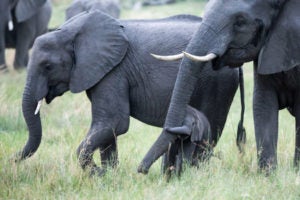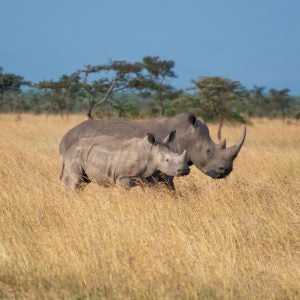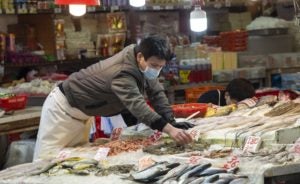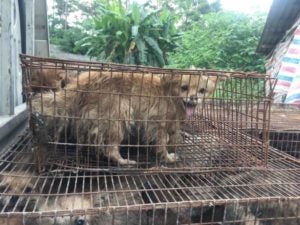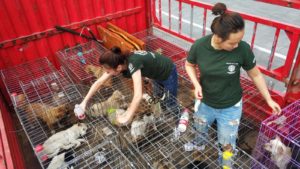
WASHINGTON – Sixty-five animal charities and pet shelters from across China have signed an open letter calling for compassion rather than cruelty to dogs and cats, in response to the coronavirus outbreak. News that an elderly dog in Hong Kong belonging to a COVID-19 patient has died following weeks of quarantine and testing, has raised fears of an increase in pet abandonment. Although the dog ultimately tested negative, and the World Health Organisation has made clear there is no evidence that dogs can infect humans, animal groups across China remain vigilant, with some shelters reporting higher than usual numbers of animals found wandering the streets.
Groups in Beijing, Dalian, Shanghai, and beyond have appealed for people not to abandon or harm their pets, and urge local police forces and community officers not to carry out lethal culls of dogs. Last month there were a number of recorded incidents of dogs being brutally beaten to death in the street in Yongjia County, Zhejiang, and in Chengdu and Nanchong in Sichuan province. And most recently video emerged of a pet dog being roughly caught by the neck by local dog catchers outside a Shanghai apartment block, and swung through the air into a cage on the back of a truck. The local government in Shanxi, north China has also called for the closure of all pet hospitals and public dog walking.
Dr. Peter Li, China policy expert at Humane Society International which works in China alongside other animal groups to protect companion animals, said: “It is very sad news that the elderly dog in Hong Kong has passed away. It must be remembered though that he ultimately tested negative for the virus, showed no signs of illness at any point, and at 17 years old it is possible that the stress of weeks of quarantine, testing, and being separated from his owner contributed to his passing. We simply don’t know, but what we do know is that the World Health Organisation advice is clear that there is no evidence dogs can pass the virus to people. It is critical that citizens and officials alike do not over-react or respond in a way that will cause harm or injury to animals. Family pets do not deserve to be turned out on the street, or beaten, or denied exercise or access to veterinary care.”
Dezhi Yu, director of Vshine, said: “Our team has been responding to help calls from different cities where local animal lovers have taken in or have spotted abandoned dogs and cats which we suspect were not allowed to be kept in their apartments, or these might be dogs or cats released by the breeders.”
HSI has been a resource for Chinese groups in coordinating public education efforts since the COVID-19 virus broke out, as well as supporting HSI’s Chinese partner group Vshine in rescuing abandoned dogs, as well as providing food and water for dogs and cats left behind when people have been evacuated and not able to return.
Download photos and video of HSI and other groups in China assisting companion animals:
ENDS
Media contact:
Wendy Higgins whiggins@hsi.org
List of letter signatories:
Signed by:
- Capital Animal Welfare Association
- Bengbu Abandoned Animal Protection Association
- Dalian Vshine Animal Protection Association
- Social law research center of Zhejiang Sci-Tech University
- Animal protection research center of Shandong university
- Taiwan Life Caring and Animal Rescue Organization
- Cat and Dog 119
- Life Caring and Animal Rescue Organization Companion
- Wenzhou Happyness Work Center
- Red Pomegranate Stray Animal Rescue Center
- Miao Stray Cat Rescue Team
- Kuntun Small Animal Protection Association
- Shenyang Micro Couplet Pet Love and rescue alliance
- Beijing Warm House Rescue Center
- Changsha Animal Protection Association
- Zhuzhou Small Animal Protection Association
- Xian Small Animal Protection Association
- Huaibei Small Animal Protection Association
- Suzhou Tiantian- Baby House
- Xian 701 Stray Animal Shelter
- Qin Huangdao Small Animal Protection Association
- Xian Weiai Animal Protection Association
- Changsha Small Animal Protection Association
- Nantong Small Animal Protection Association
- Hohhot Small Animal Protection Association
- Harbin Small Animal Protection Association
- Mudanjiang Animal Protection Volunteers Association
- Dalian Love Animal Rescue Association
- Haimen Animal Protection Volunteers Association
- Foshan Companion animal Protection Association
- Zhenzhou Animal Protection Association
- Changchun Douwang Team
- Lanzhou Stray Animal Reacue Station
- Guilin Baby Home Stray Animal Welfare Station
- Jilin Small Love Stray Animal Adopt Home
- Liuzhou Hope Home Small Animal Protection Association
- Dog’s Love Group
- Jilin Small Love Stray Animal Rescue Center
- Huludao Stray Animal Center
- Xinjiang Changji Wangwang’s Home
- Gansu Pingliang Stray Dog Rescue Center
- Nanjing University of the Arts
- Sanmenxia Stray Cat Rescue Team
- China Pet Animal Protection Public Welfare Team
- 803 Ecology and Animal Protection Public Welfare Team
- Hohhot Qishan Animal Welfare Association
- Jilin Puai Action Group
- Jianghai Stray Animal Rescue Center
- Hohhot dog rescue
- Tianjin Yishan Stray Animal Rescue Team
- Lanzhou Stray Animal Love Relay Station
- Inner Mongolia Alxa Stray Animal Rescue Station
- Yantai Stray Animal Rescue Station
- Xi ‘an Stray Animal Protection Station
- Qiqihar Small Animal Protection Association
- Qinghai Xining Small Animal Protection Association
- Xining Small Animal Protection Association
- Urumqi Outdoor Rescue Group
- Zhuhai Stray Animal Rescue Group
- Xian Stray Animal Rescue Group
- Pinggu Rescue Team
- Zhengzhou Rescue Group
- Guangdong Stray Dog Rescue Center
- Xining Stray Animal Rescue Team
- Baotou Stray Animal Rescue Center

